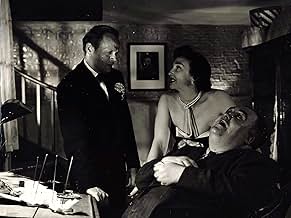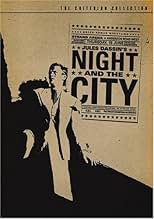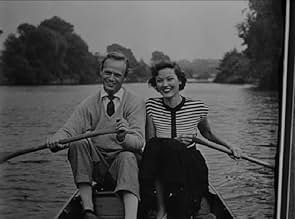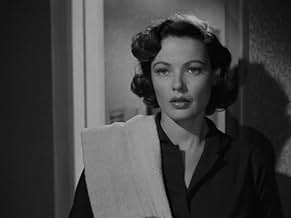IMDb-BEWERTUNG
7,8/10
16.142
IHRE BEWERTUNG
Ein kleiner Trickbetrüger und Nachtclub-Tourist nutzt einige zufällige Umstände aus und versucht, als Ringkampfveranstalter eine große Rolle zu spielen.Ein kleiner Trickbetrüger und Nachtclub-Tourist nutzt einige zufällige Umstände aus und versucht, als Ringkampfveranstalter eine große Rolle zu spielen.Ein kleiner Trickbetrüger und Nachtclub-Tourist nutzt einige zufällige Umstände aus und versucht, als Ringkampfveranstalter eine große Rolle zu spielen.
Ken Richmond
- Nikolas of Athens
- (as Ken. Richmond)
Paul Beradi
- Diner
- (Nicht genannt)
Derek Blomfield
- Young Policeman
- (Nicht genannt)
Clifford Buckton
- Policeman
- (Nicht genannt)
Ernest Butcher
- Bert
- (Nicht genannt)
Peter Butterworth
- Thug
- (Nicht genannt)
Naomi Chance
- Nightclub Hostess
- (Nicht genannt)
Edward Chapman
- Hoskins
- (Nicht genannt)
Empfohlene Bewertungen
Every where Richard Widmark's loser character Harry Fabian turns in this film he finds golden opportunities smothered in bad timing. Widmark utilizes a variation of that smarmy, snickering sinister giggle-chuckle that was memorialized in Kiss of Death.It serves the actor well in this film in its toned-down form but offers up a sort of pathetic body language for Fabian, the character. It may be that this American ex-patriot character is just way out of his depth. His hucksterism is not much appreciated by many of his acquaintances in this seedy London underworld. If Harry Fabian would simply accept that he is destined to be a 3rd rate shill and stooge,he might have fund some small pleasures. However, his mind is a shade too quick and his ambition too pumped. He's a user with not a shread of remorse about stepping on others, ripping them off, keeping one tiny step ahead of exposure. This is a superb film, squalid and sinister in its portrayal of greed, corruption and betrayal.
This gritty film, exposing the world of small time crooks in London, is a real masterpiece of film noir. The director, Jules Dassin, has captured this dark, dirty world perfectly and the black and white cinematography is superb. Richard Widmark is as despicable here as he was as Tommy Udo in "Kiss of Death"...it is a coup of casting. Francis Sullivan as Phil is great as the nightclub owner for whom Widmark shills and Googie Withers, one of my favorites of British film, is awesome as the unfaithful wife. Gene Tierney is wasted as Widmark's girlfriend...she does not seem to have much to do. Other support players are strong and you get to see Herbert Lom without his toupee! This is one of the best in the film noir genre and the ending pulls no punches. This is not a happy, feel good film. Highly recommended.
Recently out on Criterion DVD, with a restored print, this is a very nice example of 1950s film noir, although when it was made the director, Jules Dassin, didn't even know there was a classification known as film noir. In fact, the DVD extras, which include a fairly recent interview with the aging Dassin is as captivating as is the movie itself. Back in the late 1940s when "blacklisting" was a reality, Dassin was essentially told, go to London quickly, make this movie quickly, it may be your last. He made "Night and the City" without ever reading the source material, the book, and the movie is apparently quite different. Two versions were made simultaneously, using the same source film, but with different musical composers and different film editors. The DVD extras contains excerpts to demonstrate some of the differences, including a drastically different ending.
Good movie, worth a viewing for the acting of underrated Richard Widmark who plays Harry Fabian, an American post-war hustler in London. Fabian had big ideas of half-baked schemes and always was hitting up a friend for a hundred quid here, 300 quid there, to finance his latest get rich quick scheme. In the extras we learn that Gene Tierney was requested for the part of Fabian's girl Mary Bristol, because she was in a bad way after a recent romantic breakup, and according to Dassin "was suicidal." This movie helped bring her back to a good state.
Googie Withers, an actress I had never heard of, is good as Helen Nosseross, married to the rich but disgusting Phil (Francis Sullivan) and just wanting to get a license for her own night spot and a chance to break away from her husband. She is forced to deal with Fabian, a decision that cost her dearly.
Perhaps the most interesting actor is Stanislaus Zbyszko, one time "world's strongest man" from Poland, in 1949 living in New Jersey. Even though he was unexperienced, he gives a super performance as an old retired wrestler Gregorius the Great, who was grooming his son for a wrestling career. Mike Mazurki plays his nemesis, The Strangler.
Although the story gets a bit complex in the various relationships, it simply distills into Fabian seeing an opportunity to contract Gregorius to feature a wrestling match that will allow Fabian, at least in his eyes, to "control" wrestling in London. But his various scams catch up with him and all does not turn out well, as is the case in a film noir.
Good movie, worth a viewing for the acting of underrated Richard Widmark who plays Harry Fabian, an American post-war hustler in London. Fabian had big ideas of half-baked schemes and always was hitting up a friend for a hundred quid here, 300 quid there, to finance his latest get rich quick scheme. In the extras we learn that Gene Tierney was requested for the part of Fabian's girl Mary Bristol, because she was in a bad way after a recent romantic breakup, and according to Dassin "was suicidal." This movie helped bring her back to a good state.
Googie Withers, an actress I had never heard of, is good as Helen Nosseross, married to the rich but disgusting Phil (Francis Sullivan) and just wanting to get a license for her own night spot and a chance to break away from her husband. She is forced to deal with Fabian, a decision that cost her dearly.
Perhaps the most interesting actor is Stanislaus Zbyszko, one time "world's strongest man" from Poland, in 1949 living in New Jersey. Even though he was unexperienced, he gives a super performance as an old retired wrestler Gregorius the Great, who was grooming his son for a wrestling career. Mike Mazurki plays his nemesis, The Strangler.
Although the story gets a bit complex in the various relationships, it simply distills into Fabian seeing an opportunity to contract Gregorius to feature a wrestling match that will allow Fabian, at least in his eyes, to "control" wrestling in London. But his various scams catch up with him and all does not turn out well, as is the case in a film noir.
My favorite Richard Widmark performance on the screen and probably his best work is Night and the City. This was director Jules Dassin's last film before settling in Europe in the wake of the blacklist and it has a first rate cast tuned to a fine pitch, like an orchestra without a bad note in it.
Harry Fabian is this smalltime American hustler/conman who's settled in London and always working that middle ground netherworld between the law and outright gangsterism. He really isn't a very likable man and the trick is to keep the audience care what's happening to him. This is the test of a great actor and Widmark is fully up to the challenge.
Fabian while working one of his cons overhears a piece of information about the father/son relationship between champion Graeco-Roman wrestler Gregorius the Great and gangster/promoter Cristo who is the London version of Vince McMahon. He cons Gregorius into thinking he wants to promote old style wrestling like Gregorius used to do. That con game sets in motion the events of the film that ultimately end in tragedy.
The cast is uniformly fine, but one performance really stands out, that of Stanislaus Zbyzsko as Gregorius. He was a real professional wrestling champion back in the day when it was real. Zbyzsko invests so much of his own life and reality as Gregorius that he's really something special. His scenes with Herbert Lom as his son are so good they go far beyond the plane of mere acting. It's some of the best work Lom has ever done as well.
How there weren't a few Oscar nominations from this is a mystery for me. For those who like film noir, this should be required viewing. Especially for you Richard Widmark fans.
Harry Fabian is this smalltime American hustler/conman who's settled in London and always working that middle ground netherworld between the law and outright gangsterism. He really isn't a very likable man and the trick is to keep the audience care what's happening to him. This is the test of a great actor and Widmark is fully up to the challenge.
Fabian while working one of his cons overhears a piece of information about the father/son relationship between champion Graeco-Roman wrestler Gregorius the Great and gangster/promoter Cristo who is the London version of Vince McMahon. He cons Gregorius into thinking he wants to promote old style wrestling like Gregorius used to do. That con game sets in motion the events of the film that ultimately end in tragedy.
The cast is uniformly fine, but one performance really stands out, that of Stanislaus Zbyzsko as Gregorius. He was a real professional wrestling champion back in the day when it was real. Zbyzsko invests so much of his own life and reality as Gregorius that he's really something special. His scenes with Herbert Lom as his son are so good they go far beyond the plane of mere acting. It's some of the best work Lom has ever done as well.
How there weren't a few Oscar nominations from this is a mystery for me. For those who like film noir, this should be required viewing. Especially for you Richard Widmark fans.
The rise and fall of small-time hustler Harry Fabain is chronicled in this noir thriller by Director Jules Dassin.
This was Dassin's American swansong, completed just before being named by fellow director Ed Dmytryk before HUAK as a "communist," thus ending Dassin's American career.
He brought to "Night and the City" all the technique he acquired over years of quality movie making. Although born in Connecticut and raised and trained in the US, Dassin's work always had the look and feel of his European counterpart, Carol Reed.
The script here is a decent one with surprise turns, avoiding predictability. Franz Waxman's high pitched score adds excitement to the proceedings and Gene Tierney is a creditable second lead.
Yet it's Richard Widmark on whose shoulders the success of this film ultimately rests. It's not an easy role, as Fabian's character runs the gamut of emotional range as he struggles to wheel and deal his petty schemes amongst assorted lowlife types.
Widmark proves he's well up to the challenge, creating a strong portrait of a small time hood striving for positive payoffs through his callous cleverness.
It's a reminder of how talented and resourceful this actor is, and how he and Dassin meshed to create a film of impact.
Dassin, of course, went on to France after this to engage in a fabulous European period, while Widmark struggled to find scripts worthy of his formidable talents, which turned out to be few and far between.
This was Dassin's American swansong, completed just before being named by fellow director Ed Dmytryk before HUAK as a "communist," thus ending Dassin's American career.
He brought to "Night and the City" all the technique he acquired over years of quality movie making. Although born in Connecticut and raised and trained in the US, Dassin's work always had the look and feel of his European counterpart, Carol Reed.
The script here is a decent one with surprise turns, avoiding predictability. Franz Waxman's high pitched score adds excitement to the proceedings and Gene Tierney is a creditable second lead.
Yet it's Richard Widmark on whose shoulders the success of this film ultimately rests. It's not an easy role, as Fabian's character runs the gamut of emotional range as he struggles to wheel and deal his petty schemes amongst assorted lowlife types.
Widmark proves he's well up to the challenge, creating a strong portrait of a small time hood striving for positive payoffs through his callous cleverness.
It's a reminder of how talented and resourceful this actor is, and how he and Dassin meshed to create a film of impact.
Dassin, of course, went on to France after this to engage in a fabulous European period, while Widmark struggled to find scripts worthy of his formidable talents, which turned out to be few and far between.
Wusstest du schon
- WissenswertesDirector Jules Dassin made the film while in the process of being blacklisted. Fox studio chief Darryl F. Zanuck told him it could possibly be the last film he'd ever direct, so he should shoot the most expensive scenes first so the studio wouldn't be able to blacklist him until it was completed.
- PatzerAs Harry is being chased through the streets of London at night, he runs down a set of stairs, then turns and runs down a lit street. In the foreground, the cameraman and director's shadows are clearly outlined against the street.
- Zitate
Opening voice-over: Night and the city. The night is tonight, tomorrow night... or any night. The city is London.
- Alternative VersionenThere are two versions of this film: the British release and the International/American release. Some examples are: a differing voice-over speech; some changed dialogue; the opening scene where Harry returns home after 3 days away is a different take and the nightclub scenes are longer in the British version. The scores of the two films are also entirely different and alternate shots are used at the ending in the British version.
- VerbindungenEdited into American Cinema: Film Noir (1995)
- SoundtracksHere's to Champagne
(uncredited)
Written by Noel Gay
Performed by Gene Tierney (voice dubbed by Maudie Edwards)
Top-Auswahl
Melde dich zum Bewerten an und greife auf die Watchlist für personalisierte Empfehlungen zu.
- How long is Night and the City?Powered by Alexa
Details
- Erscheinungsdatum
- Herkunftsland
- Sprache
- Auch bekannt als
- Night and the City
- Drehorte
- Hammersmith Bridge, Hammersmith, London, England, Vereinigtes Königreich(Harry runs across this bridge after leaving Figler's hideout, running to Anna O'Leary's boat shop)
- Produktionsfirmen
- Weitere beteiligte Unternehmen bei IMDbPro anzeigen
Box Office
- Weltweiter Bruttoertrag
- 43.024 $
- Laufzeit
- 1 Std. 41 Min.(101 min)
- Farbe
- Seitenverhältnis
- 1.37 : 1
Zu dieser Seite beitragen
Bearbeitung vorschlagen oder fehlenden Inhalt hinzufügen








































